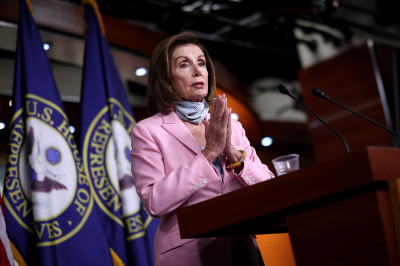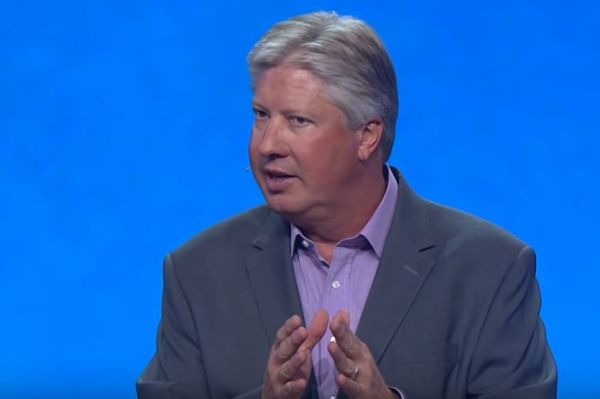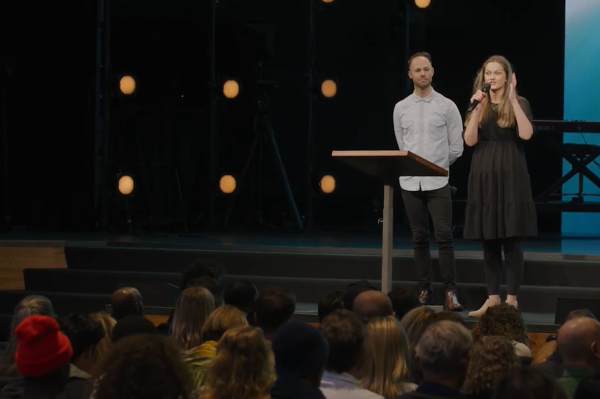No communion for thee: Nancy Pelosi, abortion and pastoral authority

In an explosive announcement two weeks ago, Archbishop Salvatore Cordileone declared that Speaker of the House Nancy Pelosi (D-Calif.) may no longer receive the sacrament of the Eucharist because of her outspoken support for abortion. The surprising news was released in a series of letters published by Cordileone, the Archbishop of San Francisco.
The decision amounts to a rare public rebuke of one of the nation’s most recognized politicians who identifies as Catholic and raises questions about pastoral authority, discipleship and spiritual responsibility.
In a letter to Pelosi published on Friday, Cordileone, who oversees Pelosi’s home diocese, explained his rationale to the Catholic lawmaker. Citing the Second Vatican Council and Pope Francis, Cordileone explained, “A Catholic legislator who supports procured abortion, after knowing the teaching of the Church, commits a manifestly grave sin which is a cause of most serious scandal to others. Therefore, universal Church law provides that such persons ‘are not to be admitted to Holy Communion.’” According to the archbishop, Pelosi’s “extreme position” on abortion combined with her regular public comments identifying herself as Catholic necessitated Cordileone take pastoral action.
Although there is precedent for Catholic bishops not admitting politicians to communion over abortion (Sen. Dick Durbin (D-Ill.) has been unable to receive the Eucharist in his home diocese for 17 years), it is rare. Moreover, Pelosi’s role as Speaker of the House (and third in line for the presidency), makes the archbishop’s decision particularly noteworthy. Thus, even for non-Catholics like myself, the story deserves attention.
First, Archbishop Cordileone underscored in his letter the “scandal” caused by Pelosi’s public support for abortion. In Roman Catholicism, a “scandal” refers to behavior that leads others to do evil. Cordileone used the word “scandal” four times to refer to Pelosi’s abortion advocacy, noting that the Speaker’s support for abortion has not only endangered her own soul but has caused harmful confusion among practicing Catholics and other Catholic politicians about the church’s teaching on abortion.
Specifically, the archbishop noted Pelosi’s regular practice of referring to her Catholic faith in the context of championing abortion. For example, as recently as May 4, Pelosi referred to herself as a “devout Catholic” and described opposition to abortion as “appalling.” Cordileone mentioned Pelosi’s recent efforts to codify Roe v. Wade into federal law after Texas passed a heart-beat bill in September. Under Pelosi’s leadership, the House of Representatives passed the Women’s Health Protection Act in September, legislation that if enacted into law would weaken conscience protections for medical professionals, jeopardize prohibitions on taxpayer funding for abortion, enshrine late-term abortion into law, strike down many pro-life laws passed in the states, and equate the death of unborn children with routine medical procedures.
Second, Archbishop Cordileone noted Pelosi’s “resistance to pastoral counsel.” In letters published on Friday to the Catholic community and fellow priests serving in the archdiocese, Cordileone explained that the Speaker’s “resistance to pastoral counsel has gone on for too long.” He noted that he has prayed and searched his conscience for years about how to respond pastorally to Pelosi’s abortion stance and has attempted — without success — to speak with her privately on at least six occasions within the previous year.
On the point of pastoral care, it is worth noting the theological implications of Cordileone’s decision to bar Speaker Pelosi from the Eucharist. The Catholic Church holds to a sacramental theology which teaches that to be in a state of grace members must regularly receive the sacraments. Among the seven sacraments recognized in Catholicism, the Eucharist (known as the Lord’s Supper or communion in other Christian traditions) is seen as the most important, as members encounter and receive the literal body and blood of Jesus in communion. However, Catholics may not receive the Eucharist if they are conscious that they have committed a grave sin and have not first made a sacramental confession (1 Cor. 11:27).
Thus, while critics in the media were swift to allege Cordileone had “weaponized” the sacrament and waded into politics, the archbishop’s decision was an unmistakable sign to Pelosi and other Catholics that he is gravely concerned about the Speaker’s soul. As he explained in a subsequent letter, his motives were “pastoral, not political.”
Third, Archbishop Cordileone’s decision to forbid Nancy Pelosi from receiving communion was motivated in part by how radical the Speaker’s abortion advocacy has become. Although Pelosi has supported abortion rights for decades, the Speaker (along with many in her party) has adopted positions in recent years that make previous support for abortion look moderate in comparison.
For example, since assuming the speakership for the second time in 2019, Pelosi has strongly advocated for the repeal of the Hyde Amendment which prohibits taxpayer funding for abortion. The Hyde Amendment has been in place for over 40 years and has been supported by both her and President Biden in the past. Moreover, as noted earlier, the Speaker’s support for the radical Women’s Health Protection Act highlights an extraordinary commitment to the abortion lobby. According to Cordileone, this commitment puts the Speaker clearly outside what is permissible for someone claiming Catholic faith.
A final point to consider from this story is the broader question of how church leaders (Catholic and non-Catholic) ought to exercise their spiritual authority when church members (particularly government officials and policy makers) are implicated in the sin of abortion. In the tradition of the Roman Catholic Church, bishops and priests bear a personal responsibility to care for the spiritual needs of the people in their diocese or parish. In 2021, Archbishop Cordileone himself explained this responsibility, saying, “I tremble that if I do not forthrightly challenge Catholics under my pastoral care who advocate for abortion, both they and I will have to answer to God for innocent blood.”
In my view, Cordileone is exactly right about his responsibility to his people, and it is appropriate for him to publicly call Speaker Pelosi to repentance for her support of abortion. The Bible teaches that ministers will one day give an account for how they stewarded their spiritual oversight of the church (Heb. 13:17). Thus, Church leaders have a special obligation to hold members accountable, especially those who are highhandedly flouting church teachings in the public square.
While politicians like Pelosi may sincerely believe they are “devout,” true devotion, in the context of a confessional community like a church, is proved by commitment to the Church’s actual teachings. As Andrew Walker observes, “To purport to be a Christian politician who can believe and advocate for things contrary to the Christian faith is a complete repudiation of what it means to be a disciple of Jesus Christ.” When Christian politicians support policies that contradict clear biblical teaching (and, in the case of the Catholic Church, clear authoritative interpretations of Church doctrine), it brings into question the authenticity of their faith.
Put another way, rejecting, denying and working against core convictions of one’s professed faith undermines the credibility of that faith and raises questions about one’s desire to remain affiliated with a church that someone has no desire to submit to or obey.
In conclusion, the Catholic Church has been consistent in its opposition to abortion. Pope Francis has called abortion a “grave sin” and the Catechism of the Catholic Church refers to abortion as a “moral evil.” Additionally, the Bible affirms the personhood of the unborn from cover to cover. Thus, from the perspective of Catholic social teaching, Archbishop Cordileone’s decision to forbid Nancy Pelosi from receiving communion is in line with the Church’s longstanding teaching on abortion.
The outrage expressed by many in the media over the archbishop’s decision demonstrates once again how disconnected most Americans are from basic Christian teachings on ecclesial authority. Thus, while commentators like entertainer Whoopi Goldberg have told Archbishop Cordileone that denying communion to Speaker Pelosi is “not your job,” Christians following this story should be grateful that the archbishop seems to know exactly what his job is in this situation — to extend pastoral care to a wayward member while courageously defending Church doctrine.
Originally published at the Family Research Council.
David Closson is the Director of Christian Ethics and Biblical Worldview at Family Research Council.





















